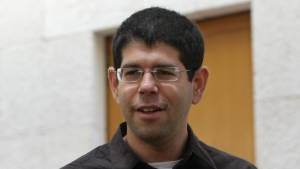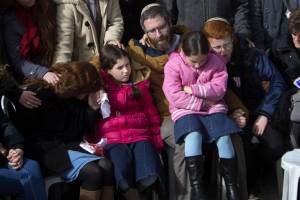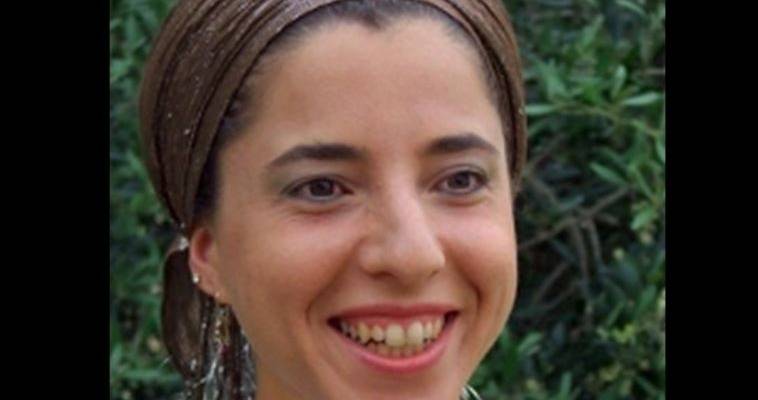
Yariv Oppenheimer, head of Peace Now organization (Kobi Gideon/Flash90)
An event in memory of Dafna Meir, murdered by a Palestinian terrorist in her home in Judea, united Israelis from diverse political streams, including the leader of Peace Now, who opposes the existence of Jewish communities in Judea and Samaria but nevertheless was inspired by her humanity.
An evening marking the shloshim – the end of the 30-day mourning period – for Dafna Meir, 38, who was slaughtered by a Palestinian terrorist in her home in the community of Otniel a month ago, took place Tuesday night, bringing together Israel’s political left and right to honor a woman who all said was exceptional.
Meeting at the Gerard Behar Center in Jerusalem, Meir’s friends and family members spoke of a woman who worked as a nurse, raised six children, advised on fertility matters, argued with rabbis, liked obscene jokes, and managed to bring hope to everyone she met. “With my heart bleeding, I chose to make this evening an evening of hope, not of despair,” said her husband Nathan.
An unexpected speaker at the event in memory of a woman who, in her own words, “each day chose to be religious, Jewish, living in a settlement,” was Yariv Oppenheimer, general director of the left-wing Peace Now organization, who was invited to the event by Dafna’s husband. Oppenheimer had come to comfort the Meir family during the shiva, the traditional seven-day mourning period, and established a warm relationship with them.
Meir ‘Broke Down the Barriers’
“I first learned about Dafna from Facebook,” Oppenheimer said. “We were not friends, but when, after the killing, my Facebook feed became full of status updates with the pictures of her and words about her, I found myself not sleeping at night as I read and read. I read about a woman who many times went against the grain, who spoke about feminism, a woman’s body, adopted kids, all with courage, depth, and humor. She broke down the boundaries. She made all the definitions so common to our Israeli discourse—’settler,’ ‘religious,’ ‘left-wing,’ ‘right-wing’—irrelevant. Her work at the hospital gave her an almost divine ability to save the lives of everyone, no matter who he or she might be. She saw a human being in everyone.”

Terror victim Dafna Meir’s family at her funeral in Jerusalem last month. (AP/Sebastian Scheiner)
Oppenheimer finished by saying, “I believe that if we had met personally, there could have been more agreement between us than disagreement, and beyond the arguing, there could have been laughter and self-irony and a desire to learn from each other. Our views differ. No need to conceal that. These controversies are not just political; they touch deeper ethical values. But we don’t need to agree with each other. We need to start talking to each other.”
Meir was described as “a friend that every woman dreams about,” by Lihi Lapid, author, journalist, and wife of Yesh Atid party leader Yair Lapid. As with others at the gathering, Lapid discovered Meir’s writings only after her death but was inspired by them. “Every woman dreams of a friend who can tell you, ‘It’s OK to ask for help, it’s OK not to be perfect, it’s OK to fight for your dreams.’ I, too, would like to have such a friend, but I didn’t meet Dafna before she was killed. Blessed be your memory, dear friend that I never met,” she said.
Meir was also remembered as a mother: “mom number one in the galaxy,” according to a WhatsApp status that Meir’s daughter Raanana suggested for her. Meir raised six children, including two foster kids. In a heartbreaking speech, her 15-year-old son Akiva said, “It’s hard to imagine you won’t call for me anymore, you won’t leave anything you do just to hug me every time I come back from yeshiva, we won’t talk at night… You won’t see my kids, and they won’t see you. And they won’t get all the love you gave us.”
Fighting back tears, he finished, “But as I try to see the bigger picture, I have just one word for you, the Lord: Thank you. Thank you for the 15 years of light.”
By: Anna Rudnitsky/TPS
